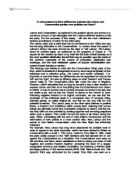To what extent have the ideas and the policies of the Conservative and the Labour parties overlapped in recent years?
To what extent have the ideas and the policies of the conservative and the labour parties overlapped in recent years
The Labour Party and the Conservative Party although appearing to be on opposite sides of the political spectrum could be seen to be more similar in recent years. In the last 10 years or so the leaders of the two parties have been similar in character and also in ideology. When Tony Blair took over as leader of the Labour Party after the tragic death of John Smith in 1994, he enthusiastically announced to the press that he was changing clause IV. Although this seemed to be a small irrelevant change it heralded a radical change in the course of the Labour party. The change was only a small change in wording but the consequences were profound. The previous clause IV had outlined the goal of an equal distribution in pay by means of nationalising all industries, the adapted clause IV was that there should be an equality of opportunity and fulfilling potential. The part about nationalisation was also scrapped. This was a change from a left-leaning, socialist party to a modern centrist party. The change in the wording precluded the overriding theme of Blair’s leadership and as Prime Minister. Blair’s stance on the economy was highly liberal; he deregulated the financial system, kept taxes the same and even privatised some of the state run industries such as the Royal Mint. Blair was also fairly conservative with regards to law and order, he was tough on crime and instead of rehabilitating criminals as a classical socialist would, he punished offenders. He was also right leaning in regards to defence and foreign policy; instead of the idea of unilateral disarmament put forward by Michael Foot, Blair in fact was pro nuclear weapons. The invasion of Iraq and Afghanistan were also seen as very conservative pieces of action. However Blair overhauled the welfare state in a socialist way, his massive increase in education and NHS spending showed a big government stance which would have been favoured by the far left. The introduction of the minimum wage also promised to protect workers and provide equal opportunities for all. The overriding feel of Blair’s tenure is a large shift to the right of the political spectrum of the Labour Party. When David Cameron took the helm of the Conservative Party in 2005 he promised to reform and realign the party. One of the most striking things about Cameron was his similarity to Blair. The two comparatively youthful leaders had a new personal feel that other leaders had previously not had, it was clear that Cameron was modelling himself on Blair. Just as Blair had promised to modernise his party Cameron was willing to do the same to his. Early in his tenure as leader he distanced himself physically to the far right former PM Thatcher, choosing not to have her endorse him and his ideas also reflected this. To appeal to centrist voters he emphasised his dedication to the NHS, previous Tory leaders had attempted to privatise aspects of the service but now Cameron was promising to protect the frontline service. He also promised to ‘decontaminate the party’ implying that he was going to get rid of the widespread elitism that was tarnishing the party name. Cameron’s leadership from the start has been seen as a shift to the left, he has appealed to the centre just as Blair had done and the two could be seen to be closer than ever; two parties fighting for the centre.








